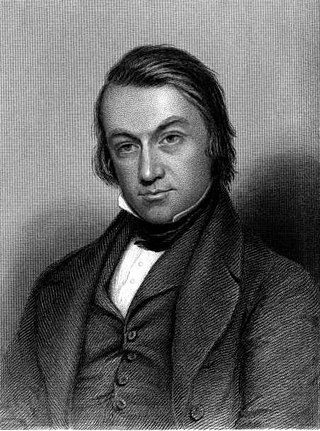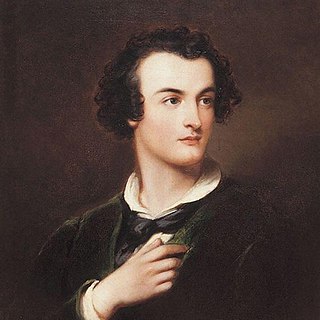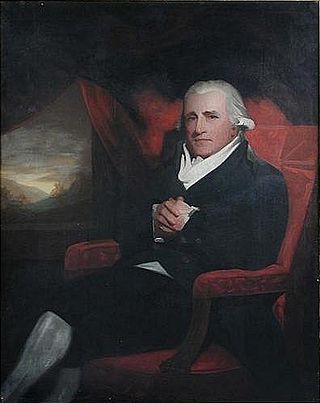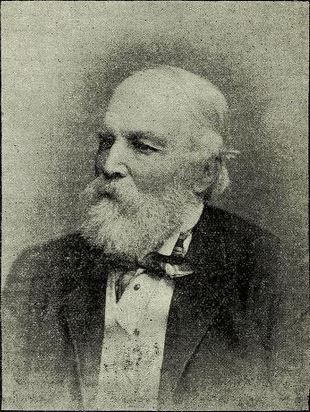Related Research Articles

William Hamilton Maxwell was an Irish novelist.

John Winston Spencer-Churchill, 7th Duke of Marlborough,, styled Earl of Sunderland from 1822 to 1840 and Marquess of Blandford from 1840 to 1857, was a British Conservative cabinet minister, politician, peer, and nobleman. He was the paternal grandfather of Prime Minister Sir Winston Churchill.

James Hamilton, 1st Duke of Abercorn,, styled Viscount Hamilton from 1814 to 1818 and The Marquess of Abercorn from 1818 to 1868, was a British Conservative statesman who twice served as Lord Lieutenant of Ireland.

George Spencer, 4th Duke of Marlborough,, styled Marquess of Blandford until 1758, was a British courtier, nobleman, and politician from the Spencer family. He served as Lord Chamberlain between 1762 and 1763 and as Lord Privy Seal between 1763 and 1765. He is the great-great-great grandfather of Sir Winston Churchill.

Sir George Murray was a British soldier and politician from Scotland.

Charles Mackay was a Scottish poet, journalist, author, anthologist, novelist, and songwriter, remembered mainly for his book Extraordinary Popular Delusions and the Madness of Crowds.

William Alexander Archibald Hamilton, 11th Duke of Hamilton and 8th Duke of Brandon styled Earl of Angus and Arran before 1819 and Marquess of Douglas and Clydesdale between 1819 and 1852, was a Scottish nobleman and the Premier Peer of Scotland.

George Spencer-Churchill, 5th Duke of Marlborough FSA, styled Marquess of Blandford until 1817, was a British nobleman, politician, peer, and collector of antiquities and books.
William Forbes Mackenzie was a Scottish Conservative politician and temperance reformer. He is best known for the Forbes MacKenzie Act, legislation passed in 1853 to regulate public houses in Scotland.

Charles William Wentworth Fitzwilliam, 5th Earl Fitzwilliam in the peerage of Ireland, and 3rd Earl Fitzwilliam in the peerage of Great Britain, was a British nobleman and politician. He was president three times of the Royal Statistical Society in 1838–1840, 1847–1849, and 1853–1855; and president of the British Association for the Advancement of Science in its inaugural year (1831–2).
Lt.-General Godfrey Bosville Macdonald, 3rd Baron Macdonald of Sleat was a Scottish aristocrat.

Sir Walter Farquhar, 1st Baronet was a Scottish physician of the late eighteenth and early nineteenth century, whose clientele included many of the leading figures of the day, including the Prince of Wales and the Prime Minister William Pitt. Farquhar abandoned his medical studies at King's College, Aberdeen to join the British Army as a surgeon during the Seven Years' War. He later worked as an apothecary in London and qualified as a physician, becoming popular with royalty and politicians and receiving a baronetcy for his services.

Sir James Caleb Anderson, 1st Baronet, was an inventor.
Annals of Philosophy; or, Magazine of Chemistry, Mineralology, Mechanics, Natural History, Agriculture and the Arts was a learned journal founded in 1813 by the Scottish chemist Thomas Thomson. It shortly became a leader in its field of commercial scientific periodicals. Contributors included John George Children, Edward Daniel Clarke, Philip Crampton, Alexander Crichton, James Cumming, John Herapath, William George Horner, Thomas Dick Lauder, John Miers, Matthew Paul Moyle, Robert Porrett, James Thomson, and Charles Wheatstone.
Katherine Thomson (1797–1862) was an English writer, known as a novelist and historian.

Charles Macfarlane (1799–1858) was a Scottish writer, known as much for his historical and travel works as he was for his novels.

Sir Archibald Alison, 1st Baronet, was a Scottish advocate (attorney) and historian. He held several prominent legal appointments. He was the younger son of the Episcopalian cleric and author Archibald Alison. His elder brother was the physician and social reformer William Alison.
Randolph Algernon Ronald Stewart, 9th Earl of Galloway was the Lord Lieutenant of Kirkcudbright from 1828 to 1845; and of Wigton from 1828 to 1851. He was styled Viscount Garlies from 1806 to 1834.

Lumb Stocks was a British engraver. In a long career he produced engravings from paintings by notable artists of the day.
References
- 1 2 "Daniel, Robert Mackenzie". Oxford Dictionary of National Biography (online ed.). Oxford University Press. doi:10.1093/ref:odnb/7119.(Subscription or UK public library membership required.)
- 1 2 Cooper, Thompson (1888). . In Stephen, Leslie (ed.). Dictionary of National Biography . Vol. 14. London: Smith, Elder & Co. p. 25.
- 1 2 Elizabeth Daniel At the Circulating Library: a Database of Victorian Fiction, 1837–1901. Retrieved 24 December 2017.
Attribution
 This article incorporates text from a publication now in the public domain : Cooper, Thompson (1888). "Daniel, Robert Mackenzie". In Stephen, Leslie (ed.). Dictionary of National Biography . Vol. 14. London: Smith, Elder & Co. p. 25.
This article incorporates text from a publication now in the public domain : Cooper, Thompson (1888). "Daniel, Robert Mackenzie". In Stephen, Leslie (ed.). Dictionary of National Biography . Vol. 14. London: Smith, Elder & Co. p. 25.